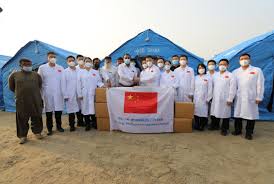
BEIJING, Nov. 30 (INP): “After the 14-day aid in Pakistan, we are ready to continue giving full play to our professional strengths and enhance exchanges with Pakistan and contribute to the reconstruction of Pakistan’s health system”, said Mr. Huang Wenxin, head of China (Guangxi) Medical Expert Team for Aiding Pakistan in Flood Relief.
The team has concluded its work in Pakistan for post-flood medical treatment and infectious disease prevention.
During the trip, the expert team, consisting of experts on gastroenterology, infectious diseases, respiratory medicine, dermatology, general surgery, nursing, monitoring, analysis and prevention of infectious diseases, drinking water sanitation, mosquito vector monitoring and transmission, environmental elimination, and laboratory testing, visited Islamabad, Karachi, and the badly-hit Khaipur District in Sindh Province.
In Gambat Relief Camp, the team donated medical supplies to Khaipur, including antibiotics and antiviral drugs for respiratory tract infections and infectious diarrhea, dermatological topical medication for infection, anti-allergy medicine, anti-diarytic medicine, mosquito repellent medicine, antimalarial medicine, malaria detection kits, protective clothing, medical masks, etc.
Experts in the team together with local doctors provided free medical care to the flood affectees. “We also checked the water source and impact of mosquitoes and flies in the camp, and discussed with the health officials of Heilbul County on how to strengthen health education for the flood victims and promote a healthy lifestyle”, Mr. Huang Wenxin told China Economic Net (CEN).
“I’m deeply impressed by the patients saying thanks to us, the hospitable local doctors, and the full support from local health officials and security personnel”, Mr. Huang Wenxin recalled.
The team also met with Pakistan’s national and local health and disaster management authorities and put forward suggestions on post-disaster medical treatment, sanitation and epidemic prevention.
It is suggested that national health campaign, medium- and long-term plans regarding the construction of hydraulic projects, and epidemic surveillance can be carried out to improve urban and rural sanitation, enhance the capacity for flood control, drought resistance, and disaster prevention, and control epidemics effectively.


































































































